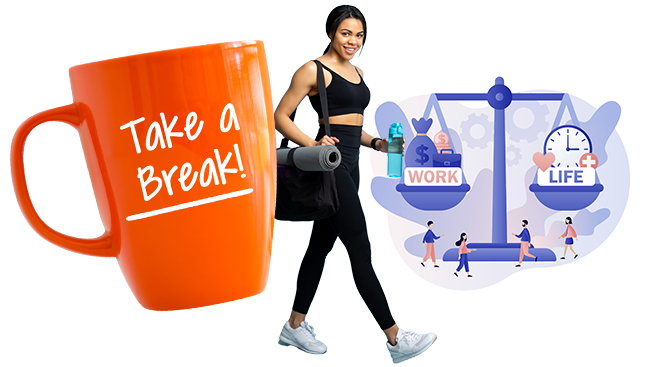Striking a healthy work-life balance in demanding workplaces is essential for your wellbeing and professional growth.
“Work hard, play hard.”
Unless you are staying under a rock, chances are this age-old saying has serenaded your ears more than once during your professional journey. However, striking that delicate balance between the realms of work and personal life is a perennial struggle for all working individuals. When it comes to balancing our life, we are all walking the tightrope, while juggling work, social life, and our health. Often neglecting the latter two in the quest to be successful in our careers. Our demanding work environment, with its quintessential erratic work hours, tight deadlines, and digital connectivity, often leaves most of us grappling with the challenge of maintaining a sense of harmony. But like the famous American singer-songwriter — Dolly Patron said, “Never get so busy making a living that you forget to make a life.” While the grind is essential, not letting work take precedence over everything else in your life, especially your wellness is also vital.
Studies have proved that working long hours in a stressful work environment can lead to serious health issues such as sleep deprivation, depression, diabetes, impaired memory, and heart disease. Thus, making the need to find a balance between professional and personal life even more important.
The perks of achieving a healthy work-life equilibrium are many. Not only does it nurtures our physical, emotional, and mental well-being, but also benefits our career progression. Scientific research affirms that those who pirouette through life balancing work, health and social life are the most productive beings, both on the office stage as well as on life's grand theatre. So, folks, mastering the wholesome work-life balance is nothing short of essential.
Wondering how to ace this elusive equilibrium?
Worry not, we have gathered some pro tips which will help you not only conquer spreadsheets but also achieve wellness in even the most demanding of workplaces. Read on…
Define Boundaries

Setting clear boundaries between work and personal time is necessary to achieve a healthy work-life balance. Start by setting specific work hours, even for WFH, and refrain from checking emails or indulging in work-related thoughts during your time. For workaholics, this may seem difficult at first, but making a conscious effort can help in the long run. Consider keeping a separate phone for work, which you can easily set aside when off duty. Inform your colleague and supervisors about these boundaries, it will help them understand and respect your personal and professional demarcation. Avoiding burnout, this practice enhances productivity and focus.
Prioritize Personal Interests
Yes, we know your job is important, but don’t let it overshadow your identity. Devoting time to personal interests and hobbies that make you happy will nourish your mind and body. Engage in activities like reading, dancing, painting, hiking, exercising, practising mindfulness or anything else that you enjoy; it will do wonders for your well-being. Carve out at least 30 minutes of ‘me-time’ daily and disconnect from work stress and concerns. Occasionally setting aside a day of complete rest can also be beneficial. This dedicated self-care time enhances your physical and emotional well-being, nurturing both you and your career.
Seek Support
Well, you can’t always be the superwoman/superman doing all the tasks at work. Don’t hesitate to speak to your superiors when your plate overflows and the work pressure gets unbearable. Request them to give you more time or allow you to share your load with colleagues. Suffering in silence and taking unnecessary stress hampers your well-being and efficiency at work.
Take Paid Leaves
You don't need to skip taking your paid holidays if not planning a fancy vacation. Instead, make sure to take these breaks for relaxation and rejuvenation. Disconnect from work, recharge, and return with renewed zest. Using your paid time off not only helps your physical and mental well-being but boosts productivity and makes you more competent to handle difficult tasks at work.
Plan & Organize
A cornerstone of balance is effective time management. Plan your tasks, set achievable goals, and allocate time for work, leisure, and personal commitments. A well-structured schedule helps mitigate stress and ensures that essential aspects of life receive the attention they deserve. Set aside ten to fifteen minutes daily to plan your tasks and activities for the day in advance, use calendars and planners to schedule tasks, and see how you seamlessly get through the day without distractions and giving your cent per cent at work.
Savour Breaks
An occasional break from your desk invigorates your workday. Go grab a cup of coffee, take a lunch break with colleagues, or indulge in an occasional chitchat session with workmates. The change of pace is always refreshing, and the break ushers in renewed perspective and sharpened focus.
Prioritize Health
If anything, that is non-negotiable at the workplace -- it is your health. If you are not healthy, it is bound to impact your work life too. Ensure you are eating on time, not skipping meals at work, taking a pause when needed and indulging in self-care. Taking care of your physical, mental, and emotional well-being will not only make you more efficient at work but also keep you happier at work and outside of the office too.






